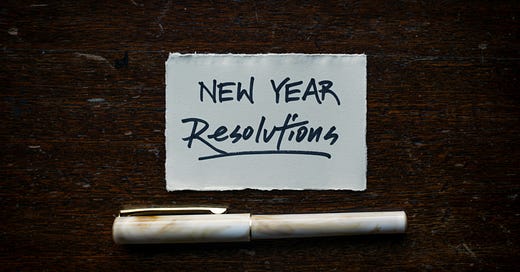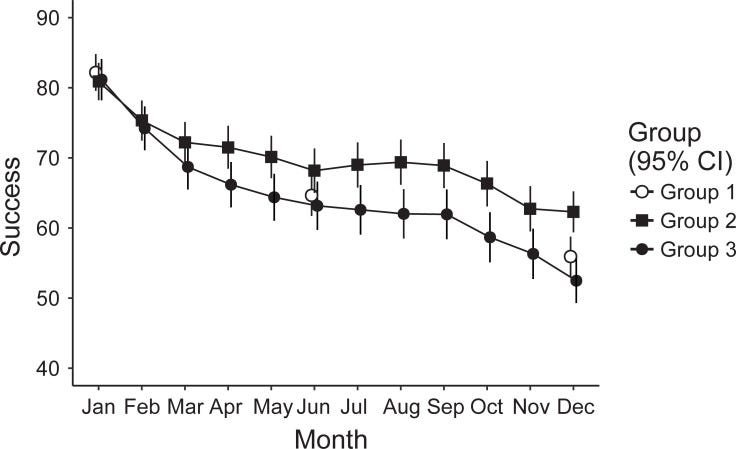This Weekend on IP Wave: A Gentle Nudge for the New Year

Hello there,
Let me ask you something: have you ever woken up on January 1st, brimming with ambition, scribbled down an impressive list of resolutions, and then promptly forgotten about half of them by mid-February? If you said yes, welcome to the club. It’s not laziness—it’s human nature. And trust me, the odds are stacked against us from the start.
Resolutions have a strange hold on us. They promise transformation, a clean break from the past, and yet they so often fizzle out. Why? It’s not just about willpower or motivation. It’s about the way we approach them—and maybe, the way we refuse to adapt when things don’t go as planned.
Why Resolutions Fail
We love the idea of change. Behavioural scientists call it the "fresh start effect"—that dopamine hit we get from imagining a better, shinier version of ourselves (Milkman et al., 2014). It’s why January 1st feels so hopeful. But here’s the kicker: this optimism often leads us to overpromise. “I’ll work out every day!” or “I’ll save 50% of my salary!” Sound familiar? It’s not that we’re lying to ourselves; it’s that we underestimate how life throws curveballs.
Research from Sweden in 2020 tracked 1,062 people who made resolutions. Their findings? Goals framed as “do more” (like exercising regularly) were far more successful than “don’t do” goals (like avoiding sweets). The success rates were clear—58.9% for approach-oriented goals compared to just 47.1% for avoidance goals (Oscarsson et al., 2020). Why? Because avoiding something feels restrictive, while adding something feels like progress.
And then there’s hyperbolic discounting—our tendency to overvalue immediate rewards at the expense of future gains (Laibson, 1997). This is why binge-watching feels irresistible compared to a morning workout, even when you know which one benefits you in the long run. Add to this the optimism bias—the belief that “this year will be different!”—and you have a recipe for broken resolutions.
Why Adaptability Matters
Instead of rigid resolutions, what if we focused on flexible goals? Prof. Alterman (1988) talks about adaptive planning, which is all about tweaking our goals to fit the realities of life. Think of it this way: rather than saying, “I’ll exercise every single day,” try, “If I can’t hit the gym, I’ll take the stairs or go for a quick walk.” It’s about creating a plan that bends, not breaks, when life gets messy.
This approach works because it gives you options. Instead of feeling like you’ve failed when plans change, you adapt and keep moving forward. It’s the same reason why implementation intentions—planning for “what if” scenarios—help people stick to their goals (Gollwitzer, 1999).
A New Way to Think About Goals
Here’s the thing: goals don’t have to be rigid or grandiose. They don’t have to scream “New Year, New Me.” Instead, they can be small, intentional, and flexible. Instead of “I’ll work out every day,” try “I’ll find ways to move more.” Instead of “I’ll save ₹10,000 a month,” start with “I’ll track my spending and adjust as needed.” These aren’t cop-outs—they’re strategies.
Life, after all, doesn’t follow a script. Why should your resolutions? So this year, let’s give ourselves permission to adapt, to recalibrate, and to try again. Resolutions aren’t about perfection. They’re about progress. And maybe, just maybe, that’s all we need.
So, here’s to a gentler approach to goals this year.

Round Ups
Why grapes sales took off on New Year's Eve
What’s with the sudden craze for grapes today?? 🤔
It's one of the highest ordered items on the platform since morning! pic.twitter.com/cdSNjHnveu— Albinder Dhindsa (@albinder) December 31, 2024
ye rahe aaj ke top 5 trending searches: milk, chips, chocolate, grapes, paneer.
tum log kitna bhi grape grape karlo agle saal tumhara katne hi vala hai— Swiggy Instamart (@SwiggyInstamart) December 31, 2024
This New Year’s Eve, grapes became an unexpected star in India. Inspired by the Spanish tradition of eating 12 grapes at midnight for good luck—one for each month—people quickly picked up the idea. Blinkit reported delivering seven times more grapes than usual, while Swiggy Instamart listed them among the most-searched items. Social media buzzed with posts of people trying out the ritual. It’s interesting to see how a tradition from Spain found its way into Indian homes, blending seamlessly with our habits. But it also makes you wonder—are we chasing a trend or simply looking for a small dose of hope as we welcome the new year? Something to think about as you plan your resolutions.
Why “buy one, get one free” isn’t a great deal
"Buy one, get one free" (BOGO) offers seem tempting, but they’re not always the great deal they appear to be. The word "free" tricks shoppers into buying more than they planned. If you didn’t need two items, you’re actually spending more. For example, a “buy one, get one 50% off” deal equals only a 25% discount overall. BOGO works well for bulk needs, but often, it leads to overspending. Next time you see “free,” think twice—are you saving or just spending more? Behavioural economics reminds us: a deal isn’t always as sweet as it sounds.
Behavioral Science in a Future Far, Far Away
Nathaniel Barr, professor of creativity and cognitive psychology at Sheridan College, and Kelly Peters, Behavioural Economics Lead & Partner at Deloitte, explore how behavioural science could shape humanity’s future. They draw on George A. Miller's warning: “The most urgent problems of our world today are the problems we have made for ourselves,” urging us to use behavioural insights to guide technological advances responsibly. As they envision a future blending humans with immersive digital realities and genetic engineering, they pose critical questions: How do we ensure equity and flourishing in a world reshaped by technology? The answers, they argue, start today.
Read more on the Behavioral Scientist
Cultural Leapfrogging: Swiping Past Tradition
Prof. Alice Evans, Lecturer at King's College London, explores the phenomenon of "cultural leapfrogging," where exposure to global media allows individuals to bypass local norms and reshape their aspirations. Drawing from Pakistan, Malaysia, Mexico, and Turkey, she argues that smartphones, with their personalised content, are accelerating cultural shifts. For example, Ece from Konya embodies this transformation, declaring, “I couldn’t care less what people in Konya think,” as she embraces autonomy inspired by Western media. However, Evans warns that such shifts often clash with traditional expectations, contributing to falling marriage rates. This tension reveals a growing mismatch between evolving aspirations and stagnant societal structures.
Read more here
💡
By Farheen





